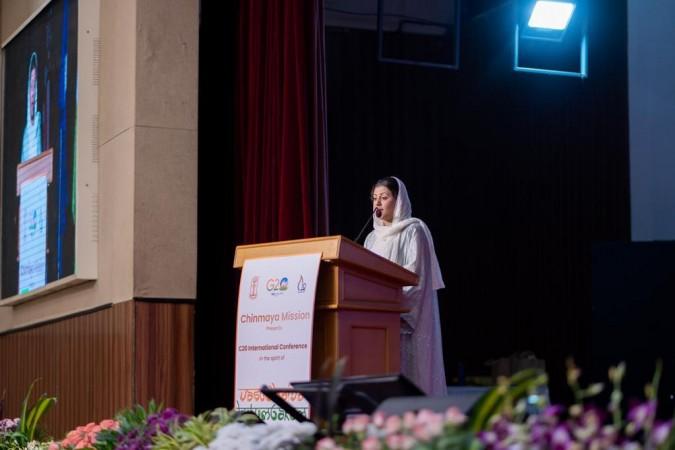The ancient practice of yoga, originating from India, has transcended borders and cultures, gaining worldwide recognition for its ability to cultivate self-control and promote inner peace. Its significance as a spiritual discipline has even piqued the interest of the G20, where the Indian Presidency for the year 2023 is actively exploring how yoga can contribute to global harmony.
Under the leadership of the Indian Ministry of External Affairs and in collaboration with the Indian Council for Cultural Relations (ICCR), the Global Program of the United Consciousness Global Association is driving this initiative. The central focus is harnessing yoga's potential to foster peace, coexistence, and personal well-being, aligning with the United Nations' Sustainable Development Goals.
Saudi Arabia, a prominent G20 member, has played a crucial role in this endeavor, actively participating in the Global Program under the banner of "One Earth, One Family, One Future through Yoga." Nouf Al-Marwaai, the head of the Saudi Yoga Committee at the Ministry of Sports, represented the Kingdom in discussions held within the Civil Society Engagement Group (C20) meetings.

Al-Marwaai elucidated the purpose of Saudi Arabia's participation, emphasizing the promotion of yoga as not just a practice but a holistic lifestyle conducive to physical and mental health. She highlighted the importance of yoga in advocating for development and peace within societies and among nations.
The essence of yoga's message, as conveyed by the Global Program, is deeply rooted in the ancient Indian philosophy that regards the world as one family. Principles such as non-violence, non-stealing, and living in peace are foundational to yoga's teachings, aligning seamlessly with the principles laid out in the Yama and Niyama principles, which date back over 600 years before Christ.

Al-Marwaai underscored the versatility of yoga, portraying it as a sport, rehabilitative practice, recreational activity, and a way of life. Its holistic nature encompasses the mind, body, and spirit, offering practitioners a pathway to peaceful coexistence by regulating the nervous system, reducing stress, enhancing cognitive abilities, and promoting self-control.
But how does yoga manifest its impact on individuals and their interactions with others? According to Al-Marwaai, yoga fosters positive behavioral changes, reducing aggression, enhancing patience, and improving focus. It nurtures social connections and a love for peace, making it a potent tool for influencing human interactions. Moreover, yoga's accessibility and affordability make it an inclusive practice that can benefit individuals worldwide without imposing financial burdens.

Saudi Arabia's active involvement in the G20 working group has borne fruit in the form of several initiatives aimed at promoting yoga and its noble goals. Among these initiatives is the celebration of the International Day of Yoga in various regions of the Kingdom, attracting a significant turnout of approximately 10,000 participants, including the Indian community residing in Saudi Arabia.
Furthermore, the Saudi Yoga Committee has embarked on efforts to engage with other Arab countries, encouraging the adoption and practice of yoga. These endeavors align seamlessly with the G20's overarching message of development and peaceful coexistence, with a particular focus on achieving the Sustainable Development Goals related to health, well-being, and enhancing the quality of life through sports.
In summary, yoga's role in promoting peace on a global scale is gaining recognition, with Saudi Arabia actively contributing to this endeavor through its representation and initiatives. The practice of yoga transcends boundaries, fostering harmony, and promoting holistic well-being, making it a valuable asset in today's world seeking unity and peace.

















